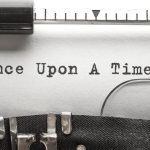Do you remember the first book you ever loved? I recall mine. It was Green Eggs and Ham by Dr. Seuss. I convinced my mom that I could read it, and I think she almost believed me. She read it to me so many times (at my request) that I had the storyline on each of the pages memorized. She would turn the page, and off I would go, telling her precisely what it said without reading a word. The story of Sam, who did not want to eat his green eggs and ham here, there, or anywhere, captured my interest as a fellow picky eater. I was less convinced by the ending when he tries green eggs and ham and discovers he likes it. That still makes no sense to me.
Even after all these years, I still remember the cajoling to eat the green eggs and ham in a box, with a fox, in a house, or with a mouse… here, there, or anywhere. I remember it partially because of exposure (shout out to Mom for reading it to me SO many times) and rhyming pattern, but more because of my connection to the words.
I’ve gone on to connect with many books and other pieces of writing, and I hope that readers form bonds with my writing. After all, no writer practices the craft hoping no one sees or reads their work. Storytelling is the best way to entice readers, connect with them, and make them want to continue reading. The importance of storytelling holds firm, regardless of the type of writing you’re doing.
The Importance of Storytelling
Storytelling goes back as long as humans have been on earth. Cave dwellers and ancient Greeks documented their lives and cultures through pictures. Later generations wrote to persuade, entertain, and share information. Today, everyone tells their stories in microbursts via social media. Whether pictorial, long-form, video, or in limited characters, the need to share stories to inform, explain, persuade, entertain, relate, and document our realities is a constant.
A key difference today in the art of storytelling is our fractured attention spans. Did you know that the average person’s attention span is less than that of a goldfish? I’m not sure how experts measure a goldfish’s attention span, but the human attention span is eight seconds. That’s not long. Couple that with the fact that every human creates an average of 1.7 MB of data every second, and you’ve got a lot of options for what a person views. Get bored in eight seconds with what you’re reading? No worries. Just click, scroll, or swipe to something else. The opportunities to find content you enjoy are seemingly endless.
So, how do people like us who write content for a living even stand a chance of keeping someone’s interest in this information-rich society? Storytelling. We have to weave a narrative that people feel drawn into and want to continue reading to discover what happens next.
The Art of Storytelling
When you understand the importance of storytelling, the question then becomes, “How?” How do you write in such a way that you capture and keep attention? I believe there’s only one way to do this — give yourself time to think.
Giving yourself time to think means not rushing from one activity (or one piece of writing) to the next. It means pausing to consider what you know about your organization, your product, your ideal audience, their needs, and your writing assignment. It sometimes means starting, then rewriting. It also occasionally means getting frustrated, taking a walk, and looking at the sky as if the answers are up there. It means thinking about how to relate to the audience about whatever you’re writing about.
I gave myself some time to think about how to approach this piece. I chose the topic a few weeks ago. When it was time to start writing, I thought, “Holy cow! That’s a big subject. Why did I do this to myself?” Then I started thinking about how much I love good storytelling and always have. That led me to my favorite books and thinking about my children’s favorite book when they were little, Barnyard Dance by Sandra Boynton. “Stomp your feet! Clap your hands! Everybody’s ready for a barnyard dance!” Then, like all parents whose children have a favorite book, I thought about how many times I read Barnyard Dance to my kids. This carried my thoughts to how seemingly everyone has a favorite book from their childhood and remembering how much I still love mine. Ah, there it is! There’s the story! A favorite childhood book. If I have one, and my children have one, and you have one, I bet many people have one. It’s something we have in common. A shared experience. Exactly what writers look for in a story.
But I must admit, sometimes you go through this process, and the story you tell still doesn’t work. Maybe you didn’t have a favorite childhood book, or no one read to you. Perhaps you just hate reading. If so, my story at the beginning of this piece probably didn’t draw you in. In fact, it’s unlikely you’re even reading this sentence. You shuffled on through the internet long ago. But if you’re still here, know that storytelling and the story you choose won’t always work for everyone. You want it to work for the audience you’re trying to attract.
Attracting Readers Through Storytelling
Let me tell you just one more thing about the power of storytelling. Sometimes good storytelling makes you read about a topic you have no interest in.
I have a friend, Jenni Carlson, who writes for The Oklahoman, the major metropolitan newspaper in Oklahoma City where I live. Jenni writes for the sports section. She’s covered our state’s sports since 1999, back when many people in Oklahoma (myself NOT included) didn’t think a woman knew anything about sports. Jenni dealt with a lot of crap from people who didn’t think she should cover sports. She probably still does. Maybe that’s why I started reading her stories — as a show of support.
I am the stereotypical opposite of Jenni. Where she knows a ton about sports, I know just enough to be dangerous. When my husband tries to talk to me about football, I just stare at him — a literal blank stare. I have no idea what the words coming out of his mouth mean most of the time. But here’s what I do know about — great writing. Through the years, I would pick up the sports section, start reading something Jenni wrote, and the next thing I knew, I’d be at the end of the article. I don’t give a flip about sports, but I care about other people, about conflict, about overcoming adversity… all the things that make a great story. Jenni is a great storyteller. She pulls me in and keeps me reading, even about topics of no interest to me. Your stories can do that too.
Embrace the Importance of Storytelling
Not everyone is a storyteller or even a writer. I get that. When I first became a journalist in 1999, my husband said it was like I “wrote essays all day.” To him, that was the worst job for anyone to have. For me, I couldn’t believe I was lucky enough to find someone to pay me to do what I loved — tell stories. I still feel that way today. If you want to be a great writer, you have to embrace storytelling. Some days it will be easier than others, but it’s always necessary.




